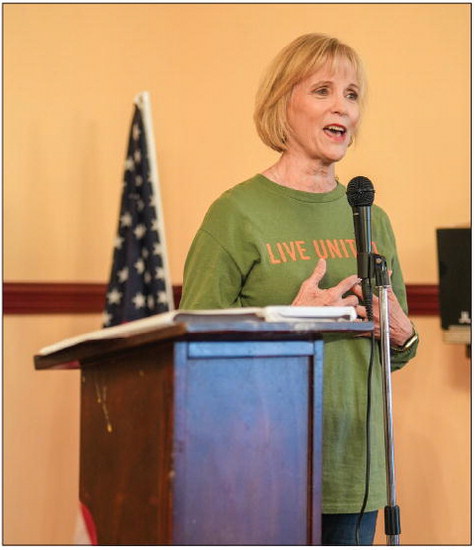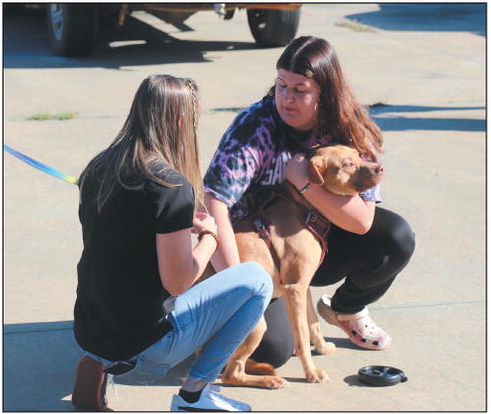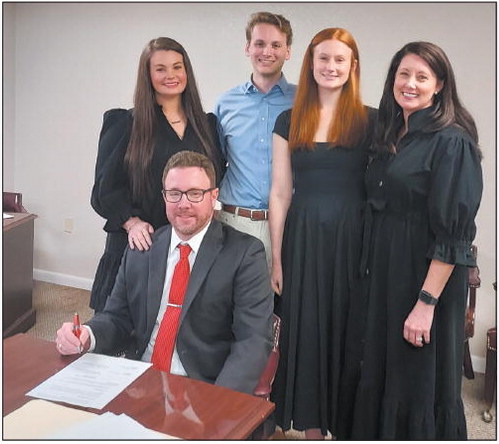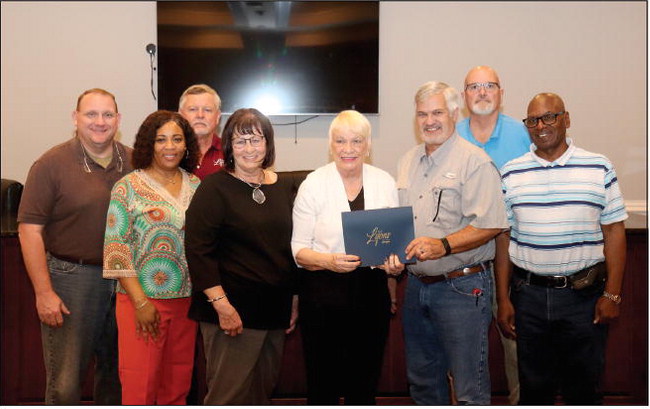Area Agencies Focus on Animal Law
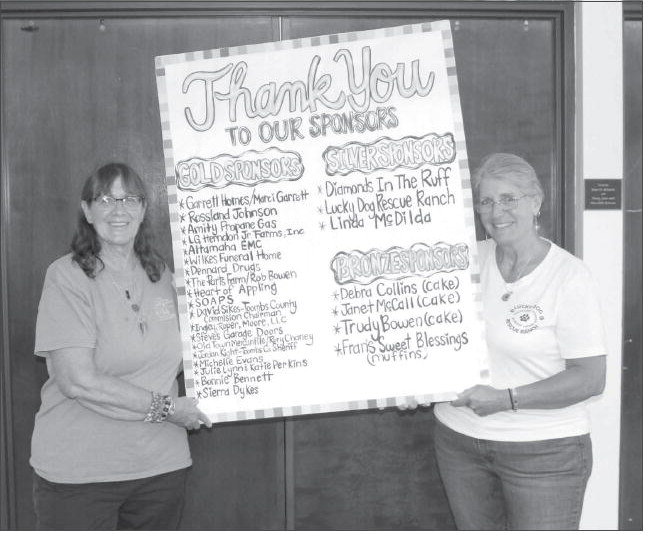

mrandolphadvance@gmail.com
Over 30 law enforcement members from Montgomery and Laurens Counties attended an animal law training seminar on Wednesday, September 20, in Mount Vernon to learn about handling animal cruelty cases and more.
Lucky Dog Rescue Ranch, which is located in Uvalda, and The Rescue Ranch, which is located in McRae-Helena, sponsored the seminar, as the rescue organizations’ founders deal on a daily basis with the struggles surrounding the lack of animal law knowledge.
Lucky Dog Rescue Ranch founder Julie Driscoll shared, “I have been involved in rescue for about five years now, and I started my own nonprofit rescue organization around April or May of this year. It’s really coming to light how much worse the situations are getting with dogs being abandoned, discarded, abused, and neglected. We are dealing a lot with unwanted litters and the problem of [animals] needing to be spayed and neutered.”
Driscoll added, “I met with Barbara at The Rescue Ranch about these issues, and we discussed having an animal law enforcement training. I’ve also been in touch with sheriffs and police about local issues, and [my] needing the law to know what the laws are so they can back us and enforce those laws.”
The Rescue Ranch founder Barbara Bruigom noted, “Teaching law enforcement officers what needs to be done in regard to animal protection not only protects the people in the community, but it protects the animals. Where you have things like dog fighting, or you have dangerous dogs, or you have dogs at large, and something gets killed, something gets injured, something happens – it’s an accident waiting to happen.”
She continued, “A lack of knowledge of the law is absolutely a challenge in the rural areas. Assistant District Attorneys and District Attorneys are overloaded; law enforcement is overloaded; most of the rural areas don’t have animal controls, they don’t have shelters – or if they do, they usually have a 10-kennel shelter that has no space for people who own pets and are passing away at a rapid rate.
“Most of the animals that we have had to deal with in the last several months have come from situations where somebody has died, or somebody has dementia, and the kids don’t want their dogs. Their families and cousins don’t want their dogs – or maybe, they have no family. So, people have to learn to make provisions for their animals, and the only way things like that are going to happen is with ordinances put in place by city and county officials. These officials need the education, and so do the people who prosecute the cases – they all need to know how to deal with these situations to keep themselves and their communities safe.”
Bruigom added, “I wish more city officials would come to these training programs. I’m talking to animal control agents who haven’t even had rabies vaccinations for themselves, and yet, they’re dealing with dangerous dog cases.They don’t know how bad something like rabies is. They don’t know how lethal it is. Everybody learns, and everybody benefits (from education), but the ultimate benefit is for the entire community.”
During the seminar, attendees heard from speakers representing both the Georgia Department of Agriculture and Georgia Department of Public Health’s Rabies Specialists, along with animal law expert and founder of Animal Law Source Claudine Wilkins.
“For Claudine Wilkins, who is such a significant person in animal law and welfare, to come to the little rural county of Montgomery and do a training session is huge. I am hoping the impact of this will be that local police and sheriffs will reach out for the resources that Claudine has provided – to ask questions, to know where to go, to know what’s right and what they should be doing,” Driscoll remarked.
Wilkins spoke on a variety of topics surrounding animal law, such as the importance of photographic evidence and contributing factors in dog bite cases, and the need for officers to be thorough and precise when building animal cruelty or dog bite cases. She emphasized that 28 counties in the state have no animal control or ordinances regarding animals; this issue of safety “sits on the shoulders of police.”
She informed attendees of tools when documenting incidents, such as the Ian Dunbar scale, which assesses the severity of a dog bite wound. Wilkins also told the group that state law mandates that a person in the county must be designated to handle rabies, and that a dog control officer must also be designated to respond to incidents. She said these designations may be assigned to one person who works in multiple counties, but this person has to be designated by local law enforcement.
“In the three decades that I’ve been at this, my experience has been that there is a huge lack of training for the very people that need it in animal cases, which run from animal crimes [like] animal cruelty, to animal fighting, to dangerous dogs, to police encounters with dogs and how to handle cases and work them up,” Wilkins remarked. “There is a huge lack of training, and there is definitely a connection between animal cruelty and human violence. In fact, there is a direct correlation between human trafficking and animal cruelty.”
She continued, “The lack of training is astounding, and really, if you come at it from a police officer and animal control safety aspect, you’ll be surprised to see what they learn in these courses, because they don’t realize sometimes that what they’re doing could be dangerous to them.”
Wilkins emphasized the need for extensive training in animal law, as the animals are dependent on others to protect them. “There are only so many victims that can’t [or won’t] speak – children, the elderly, the handicapped, domestic violence victims – but an animal is the one victim that really cannot speak at all, so we have to be able to put the pieces together to find out what’s happened and to protect them and get them out of a bad situation.”
According to Wilkins, there is a big difference in the type of animal law cases seen in the rural and urban areas. “There is a difference in mentality of how we treat animals, as well,” she explained. “Right now, animals are considered property in the state of Georgia and in many other states. But what I see in rural parts of Georgia is a disconnect between all the types of agencies. I see a lot more strays, I see a lot more lack of spay and neuter options, I see a lot more dog bites, [and] I see a lot more cruelty. A lot of people will collect animals over time while trying to be good and help, but before they know it, they’re overwhelmed with too many animals, and the animals end up suffering.”
Ultimately, Wilkins said that she hopes that the training will become standard for all veterinarians, law enforcement officers, and judicial system workers so that all may know the law regarding animals to efficiently enforce regulations and protect the creatures. She invited all of those who are interested to join her for the 24th Annual Animal Protection Society Expo, which will feature two days of classes with over 30 speakers in Alpharetta on October 20-21.
Law enforcement officers that attend the full course and stay from 9 a.m. until 3 p.m. receive P.O.S.T. training credit hours toward their annual training hour requirement. Both Bruigom and Driscoll shared that they hope to continue working to educate the public about animal laws, as well as work with several veterinary offices to offer costreduced spay and neutering options in the future.
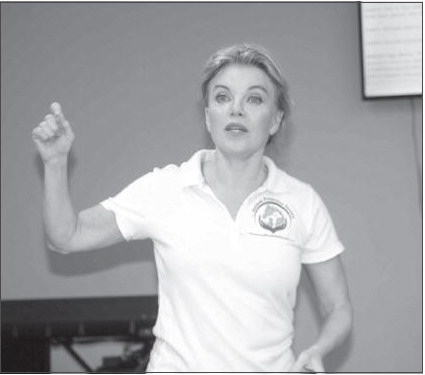
ANIMAL LAW EXPERT – Widely-known training instructor Claudine Wilkins is an expert in animal law, having worked in the field for over 30 years. She spoke locally about the importance of building animal law cases through evidence and precise detail when responding to instances involving animals.Photo by Makaylee Randolph



